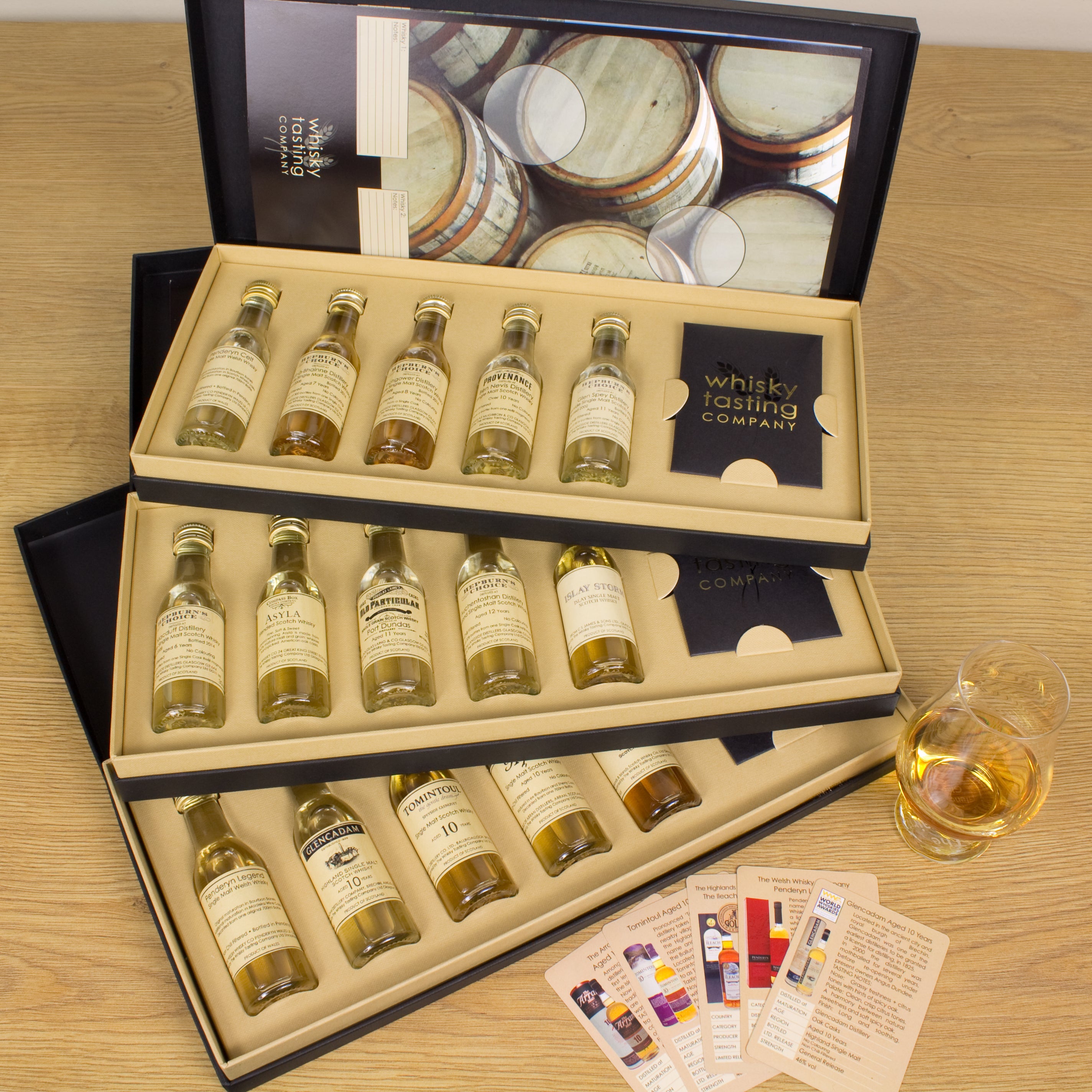Collecting rare and limited edition whiskies: a guide
Are you interested in trying your hand at whisky collecting?
The art of whisky collecting is gaining popularity within the community. It’s fun, challenging, and provides plenty of opportunities for learning and travel.
Remember all the rage when the Macallan 1926 sold for £2.1 million in 2023 at Sotheby’s in London? If you start collecting now, that could be you in a few years' time!
But how exactly do you get into collecting rare and limited edition whiskies? While they’re difficult to come by, it’s not impossible. All you need is time, money, and dedication toward the craft.
We know how daunting it is to get started, so we’re here to make sure you step on the right foot with our easy guide to rare whisky collecting. Why not start your collection off with one of our whisky tasting sets? They’re beautiful and affordable and will look great on your shelf.
What makes a whisky rare?
The term ‘rare whisky’ gets thrown around a lot, but what exactly makes a whisky rare?
While the world of rare and limited edition whiskies is nuanced, the money is in the small details (it's what collectors and auctions go wild for). Here are some things that contribute to the rareness of a bottle:
Limited production
If so many exclusive bottles of whisky are released, it’s more sought after and, therefore, more valuable.
Single cask releases, special anniversary editions, and small-batch experiments that were never mass-produced all contribute to the rarity of whisky. Once they’re gone, there are no more releases.
This also includes special collaborations, wax seals, or unique bottles, as well as signed whiskies.
Distillery closures and silent stills
When a distillery closes down for good, its final cask becomes a treasured item. Once you can't get your hands on something easily anymore, everyone wants it.
That’s why whiskies from distilleries like Brora, Port Ellen or Rosebank are in high demand; there’s no more being produced. Even temporarily “silent” distilleries can cause collectors to fight over their last released whiskies.
Age & maturation
Long-aged whiskies often gain value due to their scarcity.
While many people mistake the age for how long it's been bottled, it’s actually about the amount of time it’s spent maturing in a cask. As the liquid interacts with the wooden barrel, absorbing flavour and developing complexity, 2% of it evaporates into the air, also known as ‘the angel’s share’.
That makes older whiskies scarcer and, therefore, more expensive and difficult to get your hands on. However, some limited edition whiskies don’t carry an age at all; they’re labelled “NAS” (No Age Statement), and they’re still sought after!
Unusual cask finishes
Often, distilleries add a unique twist to the maturation and distillation process, resulting in distinctive bottles of whisky.
While most whiskies spend the whole time ageing in ex-bourbon or sherry casks, some distillers transfer the whisky into a different type of cask for the final months or years of the process.
Uncommon finishes often utilise rare or difficult-to-source barrels, making them impossible to replicate.

4 tips for collecting rare whiskies
Whether you’re already a seasoned collector or you’re just now starting to dip your toes in the sand, finding rare whiskies is a whole other ball game.
Luckily for you, we’ve compiled a list of our best tips and tricks, so you can have fun hunting for your next rare whisky find (and succeed).
1. Research before buying
Before falling for the latest limited release in the whisky community, take your time to investigate the following:
- The reputation of the distillery
- How many bottles are for purchase
- How well-made the packaging is
Is the distillery well known (think Macallan, Springbank, or Glenfarclas)? Has it made special editions in the past? Does it come with a box or certificate? Paying attention to these details will make the difference between buying a pretty bottle and something genuinely collectable.
2. Invest in whiskies you actually like
If you’re becoming a collector to actually keep and drink your whisky finds, then don’t just go with the latest trends.
Take time to hone your palate, figure out what you like, then spend your well-earned money on a whisky you’ll actually enjoy. The best collections reflect the collector’s taste, not just the latest fad in the market.
If you’d be happy to drink it if you couldn’t sell it, then you’re doing something right.
3. Record and store your whiskies
When collecting tonnes of whisky, you need to be able to keep track of them all.
Designing a tracking and coding system will help you locate a bottle quickly and actually remember what you’ve found.
You can do this by using a whisky journal or spreadsheet, where you write down the name, age, ABV, release year, origin, number of bottles released, and the price you paid for each one.
ALWAYS keep hold of any receipts, certificates, and packaging so you can validate each rare find.
4. Be wary of the hype
Building on the importance of researching before you buy and investing in what you like, it’s crucial to be cautious of any social media hype.
Before you fall for it, ask yourself, ‘is this whisky genuinely rare or just well-marketed?’ Some modern limited-edition whiskies are just made to appear that way when there’s nothing actually special about them.
Counterfeit whisky is also a significant issue, so avoid disreputable resale sites and opt for trusted retailers or official distillery shops instead. Always compare the label print quality, seal integrity, and weight to originals before buying second-hand.
Where to track down rare bottles
Unfortunately, there’s no single place where you can go to find all your rare whisky finds; it takes trial and error, a lot of time, and extensive searching.
You may need to travel to discover some rare finds, but sometimes, independent whisky sellers near you have a few hidden gems. Online retailers and independent bottlers are also excellent places to start.
Or, you can go right to the source and visit distillery shops and visitor centres for distillery-only exclusives. If you love the thrill of whisky buying, why not attend an auction? It’s the best way to discover unique bottles at a great price.
If you love to get involved in the whisky community, then there are plenty of collector groups on Facebook and whisky forums where you can swap or find people re-selling rare finds. Just always request full details before buying and ask for seller references from previous buyers.
Look for unique finishes
When hunting for a rare find, look out for the following distillation casks:
- Port, Madeira and Wine casks
- Champagne or Cuvée Casks
- Rum Casks
- Mizunara Oak: the Japanese Unicorn
- Ice Wine, Tequila and Mezcal casks
These tend to have the best resale value. If you’re serious about investing in rare whisky, keep an eye on the rare whisky index to find out which bottles are growing in value.
Displaying your finds
When you’ve spent so much time and money on something, you want to show it off!
Create a designated section on your whisky shelves to store and display your rare and limited-edition finds, keeping the bottles upright and in a cool, dry location.
UV exposure can damage the whisky and the bottle, affecting the flavour and future value. For more help with whisky storage, read our blog on stylish ideas for your whisky display.
Try out our old and rare whisky tasting sets
Do you want to start your collector journey with small steps? Or are you not quite ready to open up your rare bottles yet?
Let us help you scratch the itch with our old and rare Scotch whisky tasting sets. This set includes a rare 50-year-old Scotch from the renowned Douglas Laing of Glasgow, perfect for adding to your collection.
Plus, each set comes with five whisky tasting cards to accompany each bottle, a beautiful tasting mat, and a keepsake box. Our tasting sets are the most convenient way to discover what’s worth collecting before you commit to the full bottle.





